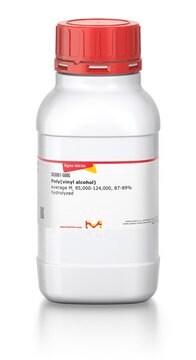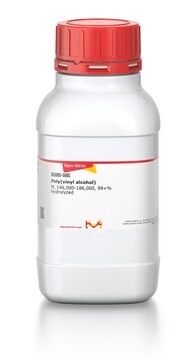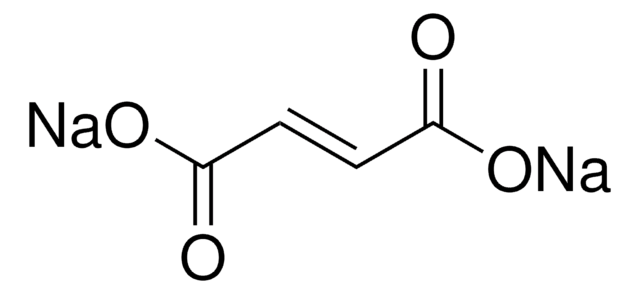456020
Sodium formate
99.998% trace metals basis
Synonym(s):
Formic acid sodium salt
Sign Into View Organizational & Contract Pricing
All Photos(3)
About This Item
Linear Formula:
HCOONa
CAS Number:
Molecular Weight:
68.01
Beilstein:
3595134
EC Number:
MDL number:
UNSPSC Code:
12352302
PubChem Substance ID:
NACRES:
NA.23
Recommended Products
Quality Level
Assay
99.998% trace metals basis
form
powder and chunks
impurities
≤25.0 ppm Trace Metal Analysis
mp
259-262 °C (lit.)
SMILES string
[Na+].[O-]C=O
InChI
1S/CH2O2.Na/c2-1-3;/h1H,(H,2,3);/q;+1/p-1
InChI key
HLBBKKJFGFRGMU-UHFFFAOYSA-M
Looking for similar products? Visit Product Comparison Guide
Related Categories
Application
- Growth, Optical, Thermal, Mechanical and Electrical Properties of Anhydrous Sodium Formate Single Crystals: This study examines the properties of anhydrous sodium formate crystals for potential device applications, highlighting their thermal, optical, mechanical, and electrical characteristics (C Amuthambigai, CK Mahadevan, XS Shajan, 2016).
- Hydroesterification of Alkenes with Sodium Formate and Alcohols Promoted by Cooperative Catalysis: Discusses a cooperative catalysis method using Ru3(CO)12 and 2-pyridinemethanol for converting alkenes into esters, employing sodium formate as a reagent (DS Kim, WJ Park, CH Lee, CH Jun, 2014).
- Energy Conservation by Oxidation of Formate to Carbon Dioxide and Hydrogen via a Sodium Ion Current in a Hyperthermophilic Archaeon: Explores how sodium formate supports energy conservation in cellular processes by facilitating sodium ion currents in an archaeal model (JK Lim, F Mayer, SG Kang, 2014).
- Eco-friendly, One-Pot Multicomponent Synthesis of Pyran Annulated Heterocyclic Scaffolds at Room Temperature Using Ammonium or Sodium Formate as Non-toxic Catalyst: Investigates the use of sodium formate as a non-toxic catalyst in the synthesis of pyran annulated heterocyclic compounds (G Brahmachari, S Laskar, 2014).
- Four Compartment Mono Selective Electrodialysis for Separation of Sodium Formate from Industry Wastewater: Focuses on a novel method for recovering sodium formate from industrial effluents using electrodialysis, highlighting its effectiveness in environmental management (H Selvaraj, P Aravind, M Sundaram, 2018).
Storage Class Code
11 - Combustible Solids
WGK
WGK 1
Flash Point(F)
Not applicable
Flash Point(C)
Not applicable
Personal Protective Equipment
dust mask type N95 (US), Eyeshields, Gloves
Choose from one of the most recent versions:
Already Own This Product?
Find documentation for the products that you have recently purchased in the Document Library.
Customers Also Viewed
Sergey Zakharov et al.
Kidney international, 86(1), 199-207 (2014-03-14)
During an outbreak of methanol poisonings in the Czech Republic in 2012, we were able to study methanol and formate elimination half-lives during intermittent hemodialysis (IHD) and continuous veno-venous hemodialysis/hemodiafiltration (CVVHD/HDF) and the relative impact of dialysate and blood flow
Jessica Momb et al.
Proceedings of the National Academy of Sciences of the United States of America, 110(2), 549-554 (2012-12-26)
Maternal supplementation with folic acid is known to reduce the incidence of neural tube defects (NTDs) by as much as 70%. Despite the strong clinical link between folate and NTDs, the biochemical mechanisms through which folic acid acts during neural
Nicolaas A Verwey et al.
Amyloid : the international journal of experimental and clinical investigation : the official journal of the International Society of Amyloidosis, 20(3), 179-187 (2013-07-09)
Abstract Amyloid β-peptide (Aβ) is a key molecule in Alzheimer's disease (AD). Reliable immunohistochemical (IHC) methods to detect Aβ and Aβ-associated factors (AAF) in brain specimens are needed to determine their role in AD pathophysiology. Formic acid (FA) pre-treatment, which
Kyle C Costa et al.
mBio, 4(2), doi:10-doi:10 (2013-02-28)
Hydrogenotrophic methanogenic Archaea require reduced ferredoxin as an anaplerotic source of electrons for methanogenesis. H(2) oxidation by the hydrogenase Eha provides these electrons, consistent with an H(2) requirement for growth. Here we report the identification of alternative pathways of ferredoxin
An efficient CoAuPd/C catalyst for hydrogen generation from formic acid at room temperature.
Zhi-Li Wang et al.
Angewandte Chemie (International ed. in English), 52(16), 4406-4409 (2013-03-21)
Our team of scientists has experience in all areas of research including Life Science, Material Science, Chemical Synthesis, Chromatography, Analytical and many others.
Contact Technical Service









